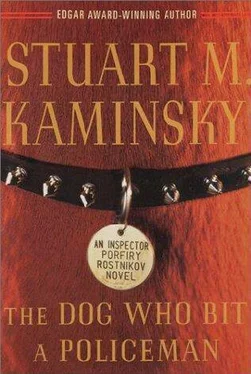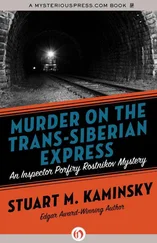Stuart Kaminsky - The Dog Who Bit a Policeman
Здесь есть возможность читать онлайн «Stuart Kaminsky - The Dog Who Bit a Policeman» весь текст электронной книги совершенно бесплатно (целиком полную версию без сокращений). В некоторых случаях можно слушать аудио, скачать через торрент в формате fb2 и присутствует краткое содержание. Жанр: Полицейский детектив, на русском языке. Описание произведения, (предисловие) а так же отзывы посетителей доступны на портале библиотеки ЛибКат.
- Название:The Dog Who Bit a Policeman
- Автор:
- Жанр:
- Год:неизвестен
- ISBN:нет данных
- Рейтинг книги:3 / 5. Голосов: 1
-
Избранное:Добавить в избранное
- Отзывы:
-
Ваша оценка:
- 60
- 1
- 2
- 3
- 4
- 5
The Dog Who Bit a Policeman: краткое содержание, описание и аннотация
Предлагаем к чтению аннотацию, описание, краткое содержание или предисловие (зависит от того, что написал сам автор книги «The Dog Who Bit a Policeman»). Если вы не нашли необходимую информацию о книге — напишите в комментариях, мы постараемся отыскать её.
The Dog Who Bit a Policeman — читать онлайн бесплатно полную книгу (весь текст) целиком
Ниже представлен текст книги, разбитый по страницам. Система сохранения места последней прочитанной страницы, позволяет с удобством читать онлайн бесплатно книгу «The Dog Who Bit a Policeman», без необходимости каждый раз заново искать на чём Вы остановились. Поставьте закладку, и сможете в любой момент перейти на страницу, на которой закончили чтение.
Интервал:
Закладка:
Leon had come to a passage that always pleased him. It was flowing, beautiful, a moment of salvation in a world of madness.
In his music, in Bach, Mozart, Schumann, and sometimes Brahms, Leon could stop being the confident, wise, supportive physician whom he had made himself into, and inside of whom existed an angry and sometimes frightened man.
Even in the hospital the people of Moscow were not safe. A woman had recently bled to death while giving birth because the power company had, without warning, turned off the hospital’s electricity in a dispute over nonpayment of bills.
The trio was coming to the end of the piece and the end of the concert. Leon did not want it to end. Given the slightest encouragement from the audience, Leon would be willing to give encore after encore throughout the night. He was sure his fellow musicians felt the same.
The horrors would not stop even during the most delicate of passages.
Leon remembered helping to treat the victims of a utility company blunder in which a high-pressure gas line had been attached to a residential neighborhood instead of the industrial plant for which it was intended. Fifteen homes had burst into flames. Fortunately, it happened in the early afternoon, which kept the number of burn victims down.
Leon knew well from the statistics he accessed on his computer that Russians are five times more likely to die from accidents than are Americans. Deaths in Russia exceed births by more than six hundred thousand. Of the boys who are now sixteen, only half would reach the age of sixty, which is a worse rate than a century ago.
The Mozart piece came to an end with Leon’s brief solo, a slow and bittersweet conclusion.
The audience consisted mostly of university students and teachers, with a smattering of old people who attended anything-concerts, lectures, travel films-as long as the evening or afternoon entertainment or enlightenment was free.
The applause was enthusiastic, appreciative, but there was something in it that the musicians frequently sensed. The people before them had decided that the diversion was over. There would be no encores this night. The audience trickled out. A few, as always, almost always the young, approached the trio, thanked them, and asked questions or simply wanted to talk about their own love of music. Part of the trio’s mission, as they saw it, was to listen em-pathetically to those who approached.
Leon adopted his physician’s manner. The others, Lev Bulmasiov and Dmitriova Berg, alternatively beamed and took on serious looks, nodding their heads, saying something that showed the person who had approached that they understood what they were trying to express.
All three-Leon, Lev, and Dmitriova-were Jews. It was the combination of their love for the same genre of music, their mu-tual background as Jews without religion, and their talent that brought them together. Lev was a successful carpenter in his forties who held an advanced degree in electrical engineering, a profession that would have earned him far less than he brought home to his family as a carpenter. Leon knew that Lev did not dislike being a carpenter but would have preferred the profession for which he had been trained and which he loved. Lev’s oboe was his solace. Dmitriova was a medical lab technician at the hospital where Leon did his volunteer work. She was in her twenties, short, approaching a serious weight problem, and very plain with slight recurrent acne. Her compensation for the body and skin that had been given her was her cello, her music. Dmitriova was easily the most talented of the trio and should have been making her living on the concert stage.
But those who managed musicians, while recognizing her talent, were certain that they could not market someone who looked like Dmitriova.
When the last questioner, the one who always lingered until the musicians said they had to leave, had departed, the trio had said good-bye, told each other that the concert had gone well, and went their own ways.
Leon dreaded the next day. He had tried to put it from his mind, but he now had to deal with it. In the morning, he would have to call his cousin Sarah and tell her that she probably needed more surgery, that something had happened, that he wasn’t sure what it was, though he was certain, as was the woman who had been the surgeon on Sarah’s original operation, that an internal examination had to be made. Leon thought the problem was a growing clot of blood in the brain, a clot resulting from the original surgery, which may have weakened a crucial vessel.
Leon had a car and, unlike the other musicians in the trio, he had no instrument to carry. He did not know how they would get home. He had offered Lev and Dmitriova rides on many occasions.
They had always politely refused with thanks. Leon understood.
They wanted to be alone with the still-living memory of the music inside them. On this night, however, Leon would have welcomed company and conversation.
Sarah and Porfiry Petrovich would take the news well and ask that the surgery be performed as quickly as possible. Leon would arrange it and tell them the absolute truth about what the surgeon might find and have to do. He would tell them that he would be present in the operating room and that, while any surgery on the brain was serious, it was likely that this operation was not life-threatening.
Leon had no brothers or sisters. Sarah was the closest relative of his generation, more a sister than a cousin. Leon’s wife had died almost ten years ago, leaving him with their son, Ivan, whose real name was Itzhak. Ivan was watched over in motherly fashion by Masha, a Hungarian woman, who had a small but comfortable room in Leon’s apartment. Leon loved his son to the point where it hurt just to see him.
Ivan showed an interest in and talent for the piano, but he did not delight and lose himself in practice as his father did. Leon doubted if his son had the emotion inside that would carry him into a musical career. No matter. The boy was smart, loving. He would do well.
Meanwhile, Leon dreaded the morning.
He had long since stopped deluding himself about his feelings for his cousin Sarah. He had loved her from the time they were children. He had longed for her. When he had married, those feelings remained tucked carefully in imaginary velvet, never to be opened for careful scrutiny.
Ivan would be asleep, but Leon would go into his room, sit at his bedside, and watch his smooth, peaceful face for as long as half an hour. Then he would go to bed, dreading what he must do in the morning.
Porfiry Petrovich did not snore, but from time to time he made a deep sigh that sounded full of promises to keep. Sarah listened to her husband sleeping. He had brought home a surprise of pizza and had done his nightly workout while the two girls sat watching.
Sarah knew the routine by heart. Rostnikov seldom deviated.
First, he turned on the cassette player after having selected whatever suited his mood. Tonight it had been Creedence Clearwater Revival. Occasionally, when he was very tired, he hummed or even sang along with the music. Tonight he had hummed.
Five people in a one-bedroom apartment was both good and bad. It was good because Sarah, when she came home after working in the music shop, liked to have company, to hear what Galina Panishkoya and her grandchildren had done all day. Galina too worked while the girls were in school. Usually, Sarah and Galina collaborated to prepare dinner. The apartment was full of life.
That was also the problem. Privacy was impossible, or almost so.
Rostnikov had kept his leg on for stability when he sat up or lay on the narrow, low exercise bench. Tonight he had worn his blue-and-white Prix de France sweatpants and shirt. Perspiration had come quickly and the humming had turned to grunts. This was the favorite part for the little girls, and Sarah knew her husband was doing a bit of play-acting to make it look hard. Porfiry Petrovich was working out with great zeal. Next month was the Izmailovo Park annual weight-lifting championship competition. Porfiry Petrovich was now eligible for the senior competition, but it was really no competition for the one-legged policeman. He usually won.
Читать дальшеИнтервал:
Закладка:
Похожие книги на «The Dog Who Bit a Policeman»
Представляем Вашему вниманию похожие книги на «The Dog Who Bit a Policeman» списком для выбора. Мы отобрали схожую по названию и смыслу литературу в надежде предоставить читателям больше вариантов отыскать новые, интересные, ещё непрочитанные произведения.
Обсуждение, отзывы о книге «The Dog Who Bit a Policeman» и просто собственные мнения читателей. Оставьте ваши комментарии, напишите, что Вы думаете о произведении, его смысле или главных героях. Укажите что конкретно понравилось, а что нет, и почему Вы так считаете.












